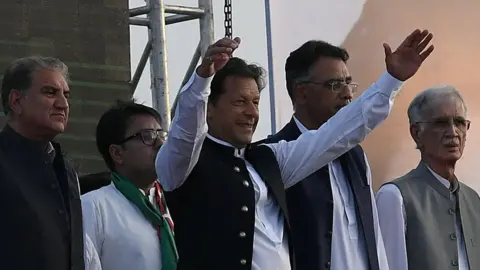Pakistan: Court to decide embattled PM Imran Khan's fate
 Getty Images
Getty ImagesPakistan's supreme court is expected to decide the fate of embattled Prime Minister Imran Khan, following a day of political turmoil.
Mr Khan has faced an attempt to oust him from office in recent days.
But in a move that has roiled the country, members of Mr Khan's party on Sunday blocked a vote of no-confidence in the PM and dissolved parliament.
Mr Khan had claimed the vote was part of a US-led conspiracy to remove him, but the US has denied this.
Furious opposition politicians have now filed a petition to the Supreme Court to rule on whether the move to block the vote was constitutional.
The court was initially expected to decide by the end of Monday, but delayed the decision until Tuesday.
Mr Khan was widely regarded as having come to power with the help of Pakistan's army, but they have since fallen out, according to observers.
His political opponents then seized this opportunity to demand a no-confidence vote after persuading a number of his coalition partners to defect to them.
On Sunday, MPs meeting to hold the vote - which Mr Khan was expected to lose - were told of an "an operation for a regime change by a foreign government".
The deputy speaker chairing the session - a close ally of the prime minister - then proceeded to declare the vote unconstitutional.
Shortly afterwards Pakistan's president Arif Alvi - who is from Mr Khan's ruling PTI party - dissolved parliament in a step towards early elections.
The move has sparked anger among the opposition, with some politicians accusing Mr Khan of "treason" for not allowing the vote to go ahead.
But in a television address and a series of late night tweets Mr Khan defended the decision.
Mr Khan has said his criticism of US policy and other foreign policy decisions has led to an attempt by the US to remove him from power.
Opposition politicians have ridiculed the accusation, and the US has denied it.
"There is no truth to these allegations... we respect and support Pakistan's constitutional process and the rule of law," a State Department spokesperson told news outlet Reuters.

A 'foreign-funded' conspiracy or a bid to entrench power?
Abid Hussain, BBC Urdu
As the holy month of Ramadan started in Pakistan, yet another political crisis embroiled the country of 220 million, as another Prime Minister was unable to finish his full term of five years.
But the overall mood seemed jubilant among the supporters of the former cricketer-turned-politician Imran Khan.
In the last week, Mr Khan has doubled down on a "secret memo", which he claims showed clear proof of a US conspiracy to overthrow his government, and has rallied his supporters by making multiple TV appearances in recent days.
Many others, however, feel that Imran Khan violated all democratic norms and pulled off a "civilian coup" in an attempt to secure power.
As the country's oldest paper, Dawn, wrote in its editorial: "No one could have guessed that his last ploy would involve having the democratic order burnt down by a democratically empowered party."

The BBC's Secunder Kermani says that many of Mr Khan's supporters still believe his narrative.
While Mr Khan's popularity has been severely dented by the rising cost of living, he still has a sizeable following and he stands a better chance in fresh elections than he did in a parliamentary vote, according to our correspondent.

Pakistan: The basics
Who is the ruling party in Pakistan? Pakistan's current ruling party is Pakistan Tehreek-e-Insaf (PTI), which is one of the three major political parties of Pakistan. It is now headed by former cricketer-turned-politician and PTI head Imran Khan, who took power as Prime Minister in 2018 after PTI emerged as the dominant party in government following the 2013 general elections.
Who are the opposition? The opposition is headed by the Pakistan Muslim League-N (PML-N) and the Pakistan Peoples Party (PPP) -- two usually feuding dynastic groups that dominated national politics for decades until prime minister Imran Khan forged a coalition against them.
How long does the prime minister serve for? The prime minister of Pakistan serves for a five-year term. However no elected or appointed prime ministers have served the entirety of their term to date.
